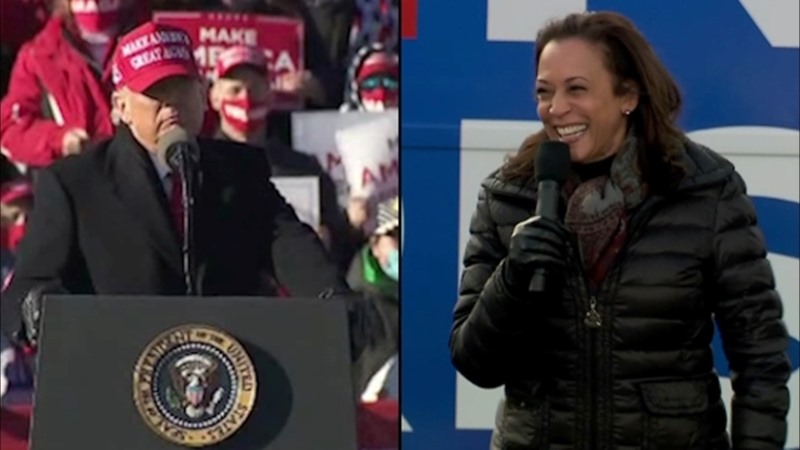Economy
Harris and the Opportunity Economy A New Vision for America
In recent weeks, Vice President Kamala Harris has centered her policy discussions around a new concept she calls the opportunity economy. This idea took center stage during her acceptance speech for the Democratic presidential nomination, where she outlined a vision in which every American is given a fair chance to succeed. The opportunity economy serves as a broad framework for her policies, encompassing everything from increased support for parents and homebuyers to combating price gouging. Interestingly, the term also borrows language traditionally used by Republicans, making it a unique and strategic move in the political landscape.
A Resonating Concept
Kylie Oversen, a North Dakota delegate, noted that the opportunity economy resonates differently with each individual. The term evokes Democratic values. It highlights using federal resources to help disadvantaged individuals secure jobs, start businesses, or purchase homes. This focus avoids more contentious issues like redistribution, equity, and diversity, making the concept more palatable to a broader audience.
Kylie Oversen’s view shows the opportunity economy’s appeal lies in its broad, non-contentious focus on practical support, according to wsj news.
Historical Republican Roots
The concept of opportunity has historically aligned with Republican ideals, emphasizing equality of opportunity over equality of outcomes. In 1986, President Ronald Reagan highlighted equal opportunities to succeed while opposing quotas. Similarly, former President Donald Trump’s urban policy created tax-favored “Opportunity Zones.” Harris’s use of this language marks a strategic shift, appropriating a traditionally Republican idea to appeal to a wider electorate.
Harris’s Convention Speech A Broad Outline
During her convention speech, provided a broad outline of Harris and the opportunity economy. She pledged to foster collaboration between businesses and labor groups to create jobs, stimulate economic growth, and reduce the cost of essential needs like healthcare, housing, and groceries. She pledged to improve capital access for small businesses and tackle the housing shortage. These promises reflect her nationwide tour’s themes, highlighting the administration’s focus on economic opportunity and delivering for Americans.
The Balancing Act Equity vs. Opportunity
Harris’s themes are widely appealing but differ from traditional Democratic goals, such as wealth redistribution to aid the poor. Recent years have seen pushback against diversity, equity, and inclusion policies, aimed at increasing representation. Progressives argue that equality of opportunity alone is insufficient; equity should be the goal. Kamala Harris has focused more on housing than President Biden, using rhetoric often linked with Republicans

Harris Campaign Urges Second Debate Trump Consents to Forum
Harris’ second debate democratic presidential nominee Kamala Harris’ campaign is pushing for a second debate with Republican…
Housing and Consumer Focus
Harris has emphasized housing more than President Biden, employing rhetoric frequently associated with Republican viewpoints.She committed to removing barriers and cutting red tape. This includes action at state and local levels to boost housing availability. Harris’s focus shifts from Biden’s worker emphasis to Americans as consumers. In her acceptance speech, she criticized Trump’s plan to raise tariffs. She framed it as a national sales tax that would disproportionately burden the middle class.
Debate Among Economists The Substance of the Opportunity Economy
Economists are divided on the definition of “opportunity” and the best ways to promote it. Greg Mankiw, a Harvard economist and former chairman of President George W.Bush’s Council of Economic Advisers called “Harris and the opportunity economy” more a pleasing slogan than a substantive policy platform. In contrast, Doug Elmendorf, a Harvard economist who served under Clinton, argued that opportunity aligns with the American ethos. He suggested various policies could fit under this concept without diminishing its validity. Elmendorf noted that Democrats have recently broadened their approach, emphasizing vocational training and apprenticeships over four-year degrees. This shift aims to expand economic possibilities.
A New Direction for Democratic Policy
Harris’s new slogan raises questions about its substance. Wisconsin delegate Garcia is optimistic, expecting more specifics soon. Harris’s “opportunity economy” may blend Democratic values with Republican rhetoric. Success will depend on addressing the diverse needs of Americans.
Get a 2-year subscription to WSJ and Barron’s News on iOS, Android, PC, and Mac. Enjoy unlimited access to The Wall Street Journal and Barron’s, including Peggy Noonan’s columns, Barron’s stock picks, WSJ Live TV, Audible articles, and Barron’s magazine.

